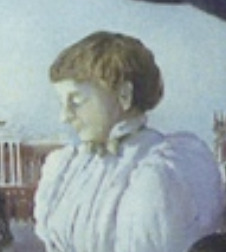Mary Morton (Kimball) Kehew
Trustee
Dublin Core
Title
Mary Morton (Kimball) Kehew
Trustee
Trustee
Description
Mary Morton Kimball, pictured here in the Notable Women of Boston mural, was born in Boston in 1859 to wealthy parents Susan Tillinghurst Morton, daughter of Massachusetts governor Marcus Morton, and Moses Day Kimball, a merchant and banker. She received her education at private schools and displayed an interest in social science early in her life. In 1880, Kimball married Boston manufacturer William B. Kehew, who was supportive of his wife’s reform work.
In 1886, Kehew joined the Women’s Educational and Industrial Union (WEIU) of Boston, an organization composed of mostly wealthy women who sought to improve working conditions for the women of Boston. Kehew became director of the WEIU in 1890 and was elected president two years later. During her tenure, she reorganized the Union to focus heavily on legislative labor reform, forming a research department designed to gather information about working conditions for use in future legal actions. Kehew also established a women’s vocational training program at the Union, offering courses in dressmaking, millinery, housekeeping, and salesmanship. The program was later absorbed by Simmons when the College opened its doors to students in 1902, and Kehew maintained a position on the school’s Board of Trustees. Among the other Boston women involved with the WEIU were Kehew’s fellow Simmons suffragists Mabel Wheeler Daniels, Susan Myra Kingsbury, and Dean Sarah Louise Arnold.
Following her term as president of the WEIU, Kehew sought to expand her labor activism further, hoping to reach a broader demographic of women workers. In 1892, she recruited Mary Kenney O’Sullivan, a former Hull House worker, to help found the Union for Industrial Progress, a group that organized labor unions for women in different trades, including bookbinding, laundry, tobacco work, and needlework. During this time, she also opened her Beacon Street home as a boarding house for working women in an effort to bring attention to class inequalities in the city. In 1903, Kehew became a founding member of the National Women’s Trade Union League (WTUL), serving until 1913 as its first president, and remaining on the board for the rest of her life.
During her career as a social reformer, philanthropist, and labor activist, Kehew was also involved in a number of other organizations, either as a member or as a financial supporter. She worked with the Denison Settlement House in Boston, the Massachusetts Minimum Wage and Child Labor Commissions, the Boston Tuberculosis Association, and the American Park and Outdoor Association, among many other organizations. She was an active suffragist, working on suffrage campaigns for the WTUL, the General Federation of Women’s Clubs, and the School Voters’ League, and hosting at least one meeting of Boston’s Ward 8 Suffrage Association at her home. Kehew also maintained an interest in providing services for blind women, supporting the Massachusetts Association for Promoting the Interests of the Blind, the Loan and Aid Society for the Blind, and the Woolson Settlement House for blind women.
Kehew died of kidney disease in Boston in 1918. She is buried in Mount Auburn Cemetery.
In 1886, Kehew joined the Women’s Educational and Industrial Union (WEIU) of Boston, an organization composed of mostly wealthy women who sought to improve working conditions for the women of Boston. Kehew became director of the WEIU in 1890 and was elected president two years later. During her tenure, she reorganized the Union to focus heavily on legislative labor reform, forming a research department designed to gather information about working conditions for use in future legal actions. Kehew also established a women’s vocational training program at the Union, offering courses in dressmaking, millinery, housekeeping, and salesmanship. The program was later absorbed by Simmons when the College opened its doors to students in 1902, and Kehew maintained a position on the school’s Board of Trustees. Among the other Boston women involved with the WEIU were Kehew’s fellow Simmons suffragists Mabel Wheeler Daniels, Susan Myra Kingsbury, and Dean Sarah Louise Arnold.
Following her term as president of the WEIU, Kehew sought to expand her labor activism further, hoping to reach a broader demographic of women workers. In 1892, she recruited Mary Kenney O’Sullivan, a former Hull House worker, to help found the Union for Industrial Progress, a group that organized labor unions for women in different trades, including bookbinding, laundry, tobacco work, and needlework. During this time, she also opened her Beacon Street home as a boarding house for working women in an effort to bring attention to class inequalities in the city. In 1903, Kehew became a founding member of the National Women’s Trade Union League (WTUL), serving until 1913 as its first president, and remaining on the board for the rest of her life.
During her career as a social reformer, philanthropist, and labor activist, Kehew was also involved in a number of other organizations, either as a member or as a financial supporter. She worked with the Denison Settlement House in Boston, the Massachusetts Minimum Wage and Child Labor Commissions, the Boston Tuberculosis Association, and the American Park and Outdoor Association, among many other organizations. She was an active suffragist, working on suffrage campaigns for the WTUL, the General Federation of Women’s Clubs, and the School Voters’ League, and hosting at least one meeting of Boston’s Ward 8 Suffrage Association at her home. Kehew also maintained an interest in providing services for blind women, supporting the Massachusetts Association for Promoting the Interests of the Blind, the Loan and Aid Society for the Blind, and the Woolson Settlement House for blind women.
Kehew died of kidney disease in Boston in 1918. She is buried in Mount Auburn Cemetery.
Creator
Ellen Lanyon
Date
1980
Citation
Ellen Lanyon, “Mary Morton (Kimball) Kehew
Trustee,” Suffrage at Simmons, accessed February 18, 2026, https://beatleyweb.simmons.edu/suffrage/items/show/18.
Trustee,” Suffrage at Simmons, accessed February 18, 2026, https://beatleyweb.simmons.edu/suffrage/items/show/18.
